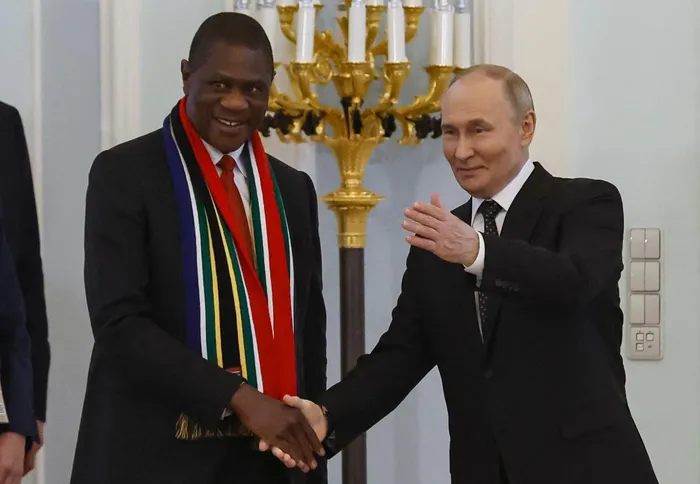
Following Trump’s statement that US imports from Russia could face a staggering 100% tariff if peace talks regarding the ongoing Russia-Ukraine conflict do not bear fruit within 50 days, worries have mounted over what this means for countries engaging in commerce with Russia, including South Africa.
Image: AFP
The Department of Trade, Industry and Competition (dtic) has sought to allay concerns regarding South Africa's trading relationship with Russia in the wake of US President Donald Trump’s recent tariff ultimatum.
Following Trump’s statement that US imports from Russia could face a staggering 100% tariff if peace talks regarding the ongoing Russia-Ukraine conflict do not bear fruit within 50 days, worries have mounted over what this means for countries engaging in commerce with Russia, including South Africa.
Russia produces 10% of the world’s crude, and it has been able to sell oil through discounted sales to China, India, Brazil and Turkey. According to the International Energy Agency Russia earned $192 billion from oil sales last year despite western sanctions.
The oil price heading for its first weekly loss in three weeks last week after Trump gave Russia a 50-day ceasefire deadline, with the Brent crude falling by 0.5% to $69.21 per barrel by Sunday.
South Africa, a member of the BRICS economic bloc alongside Russia, has already been grappling with the ramifications of heightened tariffs on its exports to the US.
With negotiations currently underway concerning 30% tariffs affecting key sectors – from citrus and wines to minerals and automotive exports – the last thing South Africa desires is further complications on the trade front.
Despite its modest reliance on Russian imports, the figures tell a nuanced story. South Africa’s bilateral trade with Russia has seen only a 7% increase, climbing from $806 million in 2023 to $864m in 2024.
In a wider context, Russia ranks as South Africa's 46th largest export destination and the 39th largest source of imports. This limited trade relationship implies that although Russia is an important ally in the BRICS bloc, the economic stakes remain relatively low.
The geopolitical battleground may complicate future transactions; however, the South African government remains keenly aware of the need to sustain a stable trading relationship with Russia while juggling the demands of the US market.
The dtic indicated that the dissimilarities in trade profile between South Africa and Russia may serve as a buffer against potential US sanctions.
South African exports have notably surged by 5%, reflecting the resilience of its agricultural products in Russian markets. Items such as citrus fruits, apples, and even consumer goods like refrigerators have managed to penetrate the Russian economy.
This expansion comes at a time when Western sanctions have compelled Russia to pivot towards alternative markets, with increasing reliance on discounted energy sales to nations such as China, India, and Turkey.
However, the dtic reiterated that while the unilateral sanctions imposed by the US and EU on Russia did not directly bind South Africa, they carried an extraterritorial effect.
This means that South African companies engaging in trade with Russia may face repercussions, including the inability to do business in the US and EU.
Notably, some Russian banks have been removed from the Society for Worldwide Interbank Financial Telecommunication (SWIFT) system, presenting barriers in banking relations and payment infrastructures for South African businesses.
The dtic highlighted that despite sanctions affecting various sectors, there remains a segment of legal trade that continues unhindered. This gives South Africa a unique opportunity to bolster its agricultural exports to Russia, particularly at a time when Russia has imposed bans on food imports from several Western nations.
“There are certain products, banks, individuals, and companies that are not under sanctions. The sectors not under sanctions and legal trade can take place include: food, agricultural commodities, medicines and medical supplies,” said Yandeya Mashau, director for Europe trade relations at the dtic.
“The Russian nuclear industry remained exempt from sanctions and the national nuclear company Rosatom remained the largest actor in the international market for nuclear reactor construction (also playing key roles in nuclear fuel supplies, nuclear equipment supplies, and handling nuclear waste)
“Currently, SA banks are reluctant to finance transactions with Russia, even in products and sectors not under sanctions. According to Russia, 70% of bilateral trade takes place via third countries such as Turkey, Azerbaijan, Latvia, UAE, Qatar, etc.
“Therefore, although there are sanctions, trade can still take place. Russia responded with sanctions against several countries, including a total ban on food imports from Australia, Canada, Norway, Japan, the United States, the EU and the United Kingdom. This creates an opportunity for SA to supply agricultural products to Russia.”
Michael Hewson, director at specialist African transfer pricing advisory firm, Graphene Economics, said Trump’s focus on introducing new tariffs and his swift changes of direction regarding implementation of these tariffs had triggered retaliatory actions from certain trade partners and injected fresh uncertainty into global markets.
“Multinational enterprises (MNEs) that are manufacturing in Africa and then distributing into the USA will need to consider their value chains,” Hewson said.
“For example, imagine a South African company that manufactures automotive components and sells them to its sister company in the United States, which then sells the completed vehicles to American customers. The price at which the South African company sells the parts to its US counterpart is the ‘transfer price’. The ripple effects of tariff-driven supply chain realignments and transfer pricing adjustments can be significant for African economies.”
BUSINESS REPORT